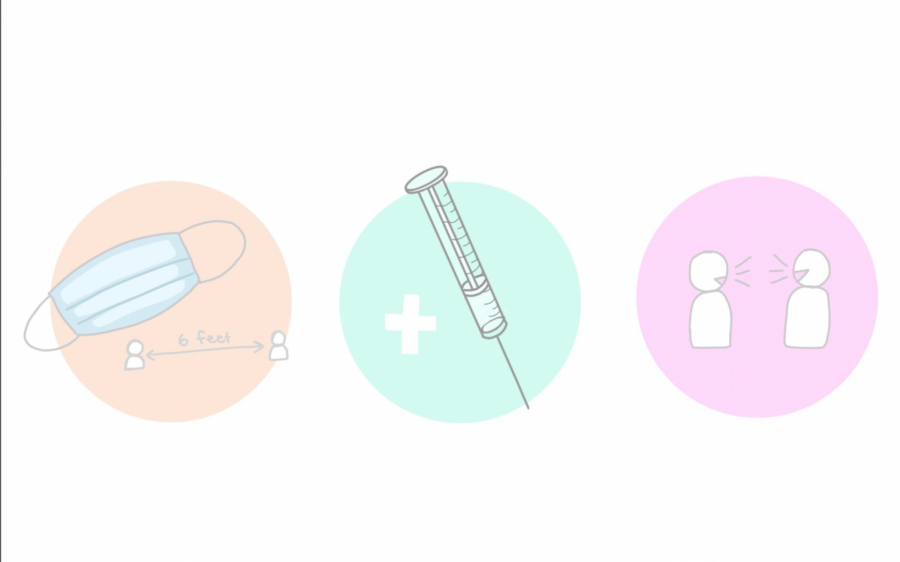COVID-19 Vaccines Are Safe, Community Members Should Get Vaccinated If Offered
In order to halt the COVID-19 pandemic and save as many lives as possible, it is crucial that eligible people receive the vaccine. Some cannot receive the vaccine due to religious objections, compromised immune systems or being newborn babies, according to Mayo Clinic. It is important to continue to wear masks and follow COVID-19 guidelines to protect those who have not been vaccinated until we reach herd immunity. Staff illustration: Tatum Herrin.
February 12, 2021
The rapid development of COVID-19 vaccines has left many wondering whether they are safe. According to extensive studies and vaccine trials, the answer to this question is yes. It is safe because its health benefits outweigh its risks. Additionally, the vaccines have undergone rigorous testing.
The U.S. Food and Drug Administration (FDA) granted the Emergency Use Authorization for the Pfizer-BioNTech and Moderna vaccines. In order to receive Emergency Use Authorization during a public health emergency, a vaccine must still complete three phases of clinical testing. A company can submit an interim analysis for their vaccine to the FDA if it meets its pre-specified criteria in its phase three clinical efficacy trial before the trial’s planned end, according to the FDA.
The interim analyses proved that after both vaccine doses, Pfizer-BioNTech’s vaccine has a 95% efficacy rate, and Moderna’s vaccine has a 94.1% efficacy rate. FDA approval for an Emergency Use Authorization does not only depend on efficacy rates but also on a company’s ability to manufacture the product consistently and to a high quality.
Coronaviruses are not new, nor is the technology behind these two COVID-19 vaccines. There has been knowledge of human coronaviruses since the mid-1960s, according to the Centers for Disease Control and Prevention (CDC). There are seven coronavirus variations in humans. Four of these viruses are more benign and cause the common cold while the other three cause severe respiratory syndromes.
The coronavirus of the current pandemic is SARS-CoV-2, or severe acute respiratory syndrome coronavirus 2. The SARS-CoV-2 virus causes the COVID-19 disease.
According to Harvard Health Publishing, scientists have studied the technology of COVID-19 vaccines’ messenger RNA, also known as mRNA, for 30 years. Scientists have previously worked with mRNA technology to develop treatments for numerous diseases including Ebola and cancers such as melanoma.
The human immune system can develop antibodies to a disease after contracting and recovering from it. This is called natural immunity. The longevity of natural immunity to SARS-CoV-2 has yet to be confirmed by scientists; several people have already contracted second cases of the COVID-19 disease.
“Experts estimate that in the U.S., 70% of the population — more than 200 million people — would have to recover from COVID-19 to halt the epidemic,” according to Mayo Clinic. If we rely on natural immunity to halt the pandemic, millions of Americans will inevitably die from the disease before the country reaches herd immunity.
I understand that there is a lot of apprehension to get the vaccine because many don’t know the science and testing behind it, but if you take ten minutes out of your day, you will see that it is all there. I felt extremely overwhelmed when I discovered that a vaccine had already been developed and that people were beginning to receive it. After learning about the technology, development and testing of the vaccine, I realized that the millions of lives that could be saved are worth receiving a vaccine that has been proven to have an efficacy rate over 94%.
When something foreign enters the human body, such as a vaccine, a drug or even junk food, there are always chances of a negative response. I know if I eat too much candy, my stomach will hurt, but sometimes I do it anyway. People take gambles with new foods and drugs for which they know the probable consequences, yet people won’t take a vaccine that could save millions of lives.
Side effects are inevitable. Even so, the CDC has listed common side effects: fever, chills, tiredness, headache, etc. After receiving a vaccine, it is common to see fatigue, swollen lymph nodes and muscle and joint pain in patients between ages 18-55 especially, after the second dose of the vaccine. According to the CDC, these side effects are normal and most of the time indicate that the vaccine is working. The CDC also created v-Safe, an optional program that allows recipients of the COVID-19 vaccine to check in or report symptoms post-vaccination.
The vaccine will not work instantly, according to the CDC. It takes a few weeks for the vaccine to build protection. During the weeks after the vaccination, if the recipient comes into contact with SARS-CoV-2 the chances of COVID-19-contraction are not completely eliminated.
During the clinical trials, four out of 43,000 participants in the Pfizer-BioNTech vaccine group, three out of 30,000 participants in the Moderna vaccine group and one person in the Moderna placebo group did develop cases of Bell’s palsy, a temporary paralysis on one side of the face. “The rate of Bell’s palsy incidence in the vaccine clinical trials was less than or equal to the rate of developing the condition in general,” according to University of Chicago Medicine. Still, the eight Bell’s palsy cases are considered an adverse event and will continue to be monitored as more people receive vaccines.
The COVID-19 vaccine will not eliminate SARS-CoV-2, but it will prevent community members from becoming severely ill with the COVID-19 disease. It is vital that people get the vaccination, if able, to protect the population, especially those who cannot receive the vaccine due to health conditions. It is our best shot at getting life back to normal and saving millions of lives. After receiving the vaccination, it is essential to continue wearing masks and following social distancing guidelines because you can still carry and spread the disease to those who have yet to be vaccinated.




